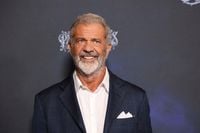SYDNEY, May 8 — Australia’s film industry is calling on actor Mel Gibson to leverage his influence with U.S. President Donald Trump to convince him to retract recently announced film tariffs that could devastate the local industry, valued at A$1 billion (approximately $650 million). Industry leaders are voicing concerns that these tariffs could lead to significant job losses and increased ticket prices, urging Gibson, who has been appointed as a "special ambassador" to Hollywood, to advocate against this decision.
On May 4, 2025, Trump announced a staggering 100% tariff on films produced outside the United States, claiming that the American film industry was facing a "very fast death" due to international incentives enticing filmmakers away. This move has left studio executives baffled, as they grapple with the implications of such tariffs on an industry that has long relied on international collaboration.
Kate Carnell, chair of Screen Producers Australia, expressed her hope that Gibson would advise Trump against the tariffs, stating, "Hopefully Mel Gibson, as one of Trump’s advisers in this space, is telling the President that this is a dumb idea." She emphasized the absurdity of the situation, noting, "For Mel Gibson to make his movie in Italy and then to have a 100% tariff for it to be shown in America is just nonsensical." Gibson is reportedly planning to shoot a film in Italy this year, which could be affected by the tariffs.
The Australian film industry has become increasingly intertwined with Hollywood since the early 2000s, when major productions like the "Star Wars" prequels and "Matrix" sequels were filmed in Sydney. According to Screen Australia, international spending on film and television productions in Australia accounted for about half of the industry’s total expenditure of A$1.7 billion in 2024. This figure has fallen by 29% from the previous year, partly due to a Hollywood writers' strike.
Carnell warned that a 100% tariff would be catastrophic for the Australian film sector, stating, "We’re talking about a lot of jobs (lost), hard to put a number on them." She added that if Hollywood studios were forced to shoot all movies in the U.S., production costs would rise, leading to higher ticket prices for consumers.
Kate Marks, CEO of Ausfilm, which connects international studios with Australian resources, remarked on the long-standing collaborative relationship between the U.S. and Australia in filmmaking. She stated, "We are closely monitoring the situation and awaiting further details and will continue to work with our industry and government partners." In Queensland, where major films like "Thor: Ragnarok" and "Aquaman" were filmed, the state’s screen agency emphasized the global connectivity of the film industry.
In the UK, officials are already in discussions with their U.S. counterparts regarding the proposed tariffs. Creative industries minister Chris Bryant informed parliament that they are working diligently to protect the UK’s robust film and TV production sector, which had a production spending of $5.91 billion in 2024. Bryant expressed uncertainty about how the tariffs would be implemented, given the complex nature of film production across various locations.
Meanwhile, the Indian film industry, which generates around 40% of its overseas revenue from the U.S., is also expressing alarm over the potential impact of the tariffs. Filmmaker Anubhav Sinha noted that the definition of "foreign produced" films remains unclear, complicating the industry’s response. He stated, "The real question is how the term ‘foreign produced’ will be defined, and until that’s clear, it’s hard to say anything."
India’s film industry employs approximately 272,000 individuals and earned about 20 billion rupees ($237 million) in overseas box office takings in fiscal 2024. Producer Madhu Bhojwani pointed out that any increase in costs due to tariffs would directly affect audience turnout, especially among the significant Indian diaspora in the U.S., which is estimated at 5.2 million people.
Bhojwani cautioned that if the tariffs encompass post-production services, the ramifications would be even more severe. He explained, "We can expect a potential decline in outsourced work from U.S. studios to Indian vendors, which could have notable implications for the Indian media services sector." This could lead to budget adjustments and a restructuring of big-budget films that rely heavily on overseas revenue.
Prominent Indian actor Prakash Raj criticized Trump’s tariff announcement, labeling it as "tariff terrorism." He echoed concerns that even a minor drop in revenue for mid-scale films could significantly impact their viability in the U.S. market, where Indian films have traditionally found a receptive audience.
In light of these developments, Jon Voight, another actor appointed as a "special ambassador" alongside Gibson and Sylvester Stallone, has proposed a different approach to reinvigorate Hollywood. Voight is advocating for a 10-20% federal tax credit on top of state incentives to keep productions in the U.S. His plan includes a provision for imposing a tariff of 120% on productions that opt for foreign tax incentives instead of filming domestically.
Voight expressed that the response to his proposal has been positive among industry insiders. He emphasized the need for the U.S. to remain competitive against countries like Canada and the UK, which have attracted Hollywood productions with favorable financial incentives. He stated, "We’ve got to roll up our sleeves here. We can’t let it go down the drain like Detroit."
As the film industry grapples with these challenges, the future remains uncertain. The proposed tariffs and potential retaliatory measures could reshape the landscape of international filmmaking, impacting not only Hollywood but also film industries around the world. With key figures like Mel Gibson and Jon Voight involved, the hope is that a resolution can be found that protects the interests of filmmakers globally.

